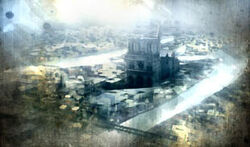Jasca Ducato (talk | contribs) m (Undo revision 716561 by Batalex 34 (talk) Unneccessary subheader) |
No edit summary |
||
| Line 11: | Line 11: | ||
*[[Parisian Rite of the Templar Order|French Rite]]<br>[[Jacobins]]<br>[[Girondists]]<br>[[French Army]] |
*[[Parisian Rite of the Templar Order|French Rite]]<br>[[Jacobins]]<br>[[Girondists]]<br>[[French Army]] |
||
|founded = [[National Assembly]] |
|founded = [[National Assembly]] |
||
| − | |date = August 843 (as Kingdom of France)<br>22 September 1792 (as First French Republic) |
+ | |date = August 843 (as Kingdom of France)<br>22 September 1792 (as First French Republic)<br>25 February 1848 (as Second French Republic) |
|hidea = yes}} |
|hidea = yes}} |
||
'''France''' is a country situated in Western Europe, which shares a border with, among others, [[Italy]], [[Germany]], [[Switzerland]], and northeastern [[Spain]]. |
'''France''' is a country situated in Western Europe, which shares a border with, among others, [[Italy]], [[Germany]], [[Switzerland]], and northeastern [[Spain]]. |
||
Revision as of 07:43, 25 January 2018

|
Patience, brothers. Soon we will reveal the secrets of Assassin's Creed: Rogue and Assassin's Creed: Unity. This article has been identified as being out of date. Please update the article to reflect recent releases and then remove this template once done. |

|
Ezio, my friend! How may I be of service? This article is in desperate need of a revamp. Please improve it in any way necessary in order for it to achieve a higher standard of quality in accordance with our Manual of Style. |
France is a country situated in Western Europe, which shares a border with, among others, Italy, Germany, Switzerland, and northeastern Spain.
As one of the most central and biggest powers on the European continent, France's social and political affairs have often been influenced by the Assassin Brotherhood and Templar Order since at least the Middle Ages. It was also notably the country where the Order of the Knights Templar, as a military order, was both founded and disbanded.
History
Middle Ages
During the 12th century, French soldiers, along with English and German troops, descended on the Holy Land to participate in the Crusades. French Templar knights were among the most dangerous fighters of their time, though many were assassinated by the Levantine Assassin Altaïr Ibn-La'Ahad.
In 1307, King Philip IV of France, who was heavily in debt to the Order of the Knights Templar, was manipulated by the French Assassins into disbanding the Templars by accusing them of heresy. King Philip arrested hundreds of Templars, and burned their Grand Master, Jacques de Molay, at the stake, driving the Order back underground.[1]
From 1337 to 1453, France became involved in the Hundred Years' War with England, fighting for control over the French throne. England repeatedly led expeditions into French soil, which dealt a huge toll of the economy and the nation's morale. In response, the French built the Bastille in the late 14th century to defend Paris from the English threat, playing a vital role in internal conflicts.[2]
In the 1400s, Jeanne d'Arc acquired a Sword of Eden, and led French soldiers to victories in the war. In 1431, she was captured and executed by the English, while opportunistic Templars took the Sword.[3]
Renaissance

Paris during the Renaissance
During the Renaissance, France was ruled by King Louis XII from his capital in Paris, though he was drawn away from the throne by his military conquests. During his absence, he left his foreign ministers in command, not knowing that they were working for the Borgia.[4]
In the early 1510s, a French Army, under the command of Octavian de Valois, was employed by Cesare Borgia, the Captain General of the Papal Armies, in order to help unite Italy under the Papal banner.[5]
Age of Enlightenment
During the Age of Enlightenment, France, in competition with Spain and England, sought to build up their Empire by capturing territories in Africa and, to a lesser extent, the West Indies.
France aided the Thirteen Colonies during the American Revolutionary War: the Marquis de Lafayette served as George Washington's aide-de-camp from 1777, and the French Navy, under Admiral De Grasse, was instrumental in securing victory.[6]
French Revolution
Eventually, numerous troubles in their homeland led to the French having their own revolution in 1789,[7] and control of France ultimately fell to one Napoleon Bonaparte, a skilled military Commander in possession of an Apple of Eden. From 1804 to 1815, Napoleon ruled over France and Western Europe as an Emperor.[8]
Belle Époque
After the end of the Franco-Prussian war in 1871, France enjoyed a period of peace and prosperity which would last until 1914. Dubbed as 'Belle Époque', Paris underwent technological advances which led to increase in size, economic power as well as the improvement of life quality.[2]
In 1889, the construction of the Eiffel Tower was complete, with the landmark becoming the symbol of France's new engineering prowess and of the Époque itself.[2]
References
